- Home
- Diana Wynne Jones
Fire and Hemlock
Fire and Hemlock Read online
FIRE AND HEMLOCK
Diana Wynne Jones
ILLUSTRATED BY DAVID WYATT
Dedication
To Laura
Contents
Cover
Title Page
Dedication
Part One New Hero
1 A dead sleep came over me And from my horse I fell
2 O I forbid you, maidens all, That wear gold in your hair, To come or go by Carterhaugh For young Tam Lin is there.
3 Abide you there a little space And I will show you marvels three
4 The steed that my true-love rides on Is fleeter than the wind; With silver he is shod before, With burning gold behind.
5 O see you not yon narrow road So thick beset with thorns and briars? That is the path of Righteousness, Though after it but few enquires.
6 O they rode on, and further on, The steed went swifter than the wind, Until they reached a desert wide And living land was left behind.
Part Two Now Here
1 And fill your hands o’ the holy water And cast your compass round
2 She had not picked a rose, a rose, A rose but barely one, When up and started young Tam Lin
3 O they rode on and further on, They waded rivers above the knee, And they saw neither sun nor moon, But they heard the roaring of the sea.
4 The truth I’ll tell thee, Janet; In no word will I lie
5 But aye she grips and holds him fast
6 And pleasant is the fairy land For those that in it dwell, But at the end of seven years They pay a tax to hell.
Part Three Where Now?
1 It was mirk, mirk night, there was no starlight; They waded through red blood to the knee, For all the blood that’s shed on earth Runs through the springs of that country.
2 They’ll turn me in your arms, lady, Into a serpent or a snake
3 But, Thomas, you shall hold your tongue
4 They’ll turn me in your arms, lady, Into a deer so wild, But hold me fast, don’t let me go
5 “Harp and carp, Thomas,” she said, “Harp and carp along with me, And if you dare to kiss my lips, Sure of your body I will be.”
6 They’ll shape me in your arms, lady, A hot iron at the fire, But hold me fast, don’t let me go, To be your heart’s desire.
7 Out then spoke her brother dear – He meant to do her harm – “There grows a herb in Carterhaugh…”
Part Four Nowhere
1 Had I the wit yestreen, yestreen, That I have got today, I’d pay my tax seven times to hell Ere you were won away!
2 O first let pass the black, lady, Then let pass the brown, But quickly run to the milk white steed—Pull you his rider down.
3 But the night is Hallowe’en, Janet, The morn is Hallowday
4 That is the path of Wickedness, Though some call it the Road to Heaven.
5 About the dead hour of the night She heard the bridles ring, And Janet was as glad of that As any earthly thing.
6 And see you not yon bonny road That winds across the ferny lea? That is the road to fair Elfland Where you and I this night must be.
Coda scherzando
Coda They shaped him in her arms at last A mother-naked man
Other Works
Copyright
About the Publisher
PART ONE
NEW HERO
allegro vivace
1
A dead sleep came over me
And from my horse I fell
TAM LIN
Polly sighed and laid her book face down on her bed. She rather thought she had read it after all, some time ago. Before she swung her feet across to get on with her packing, she looked up at the picture above the bed. She sighed again. There had been a time, some years back, when she had gazed at that picture and thought it marvellous. Dark figures had seemed to materialise out of its dark centre – strong, running dark figures – always at least four of them, racing to beat out the flames in the foreground. There had been times when you could see the figures quite clearly. Other times, they had been shrouded in the rising smoke. There had even been a horse in it sometimes. Not now.
Here, now, she could see it was simply a large colour photograph, three feet by two feet, taken at dusk, of some hay bales burning in a field. The fire must have been spreading, since there was smoke in the air, and more smoke enveloping the high hemlock plant in the front, but there were no people in it. The shapes she used to take for people were only too clearly dark clumps of the dark hedge behind the blaze. The only person in that field must have been the photographer. Polly had to admit that he had been both clever and lucky. It was a haunting picture. It was called Fire and Hemlock. She sighed again as she swung her feet to the floor. The penalty of being grown up was that you saw things like this photograph as they really were. And Granny would be in any minute to point out that Mr Perks and Fiona were not going to wait while she did her packing tomorrow morning – and Granny would have things to say about feet on the bedspread. Polly just wished she felt happier at the thought of another year of college.
Her hand knocked the book. Polly did not get up after all. And books put down on their faces, spoiling them, Granny would say. It’s only a paperback, Granny. It was called Times out of Mind, editor L. Perry, and it was a collection of supernatural stories. Polly had been attracted to it a couple of years back, largely because the picture on the cover was not unlike the Fire and Hemlock photograph – dusky smoke, with a dark blue umbrella-like plant against the smoke. And, now Polly remembered, she had read the stories through then, and none of them were much good. Yet – here was an odd thing. She could have sworn the book had been called something different when she first bought it. And, surely, hadn’t one of the stories actually been called ‘Fire and Hemlock’ too?
Polly picked the book up, with her finger in it to keep the place in the story she was reading. ‘Two-timer’ it was called, and it was about someone who went back in time to his own childhood and changed things, so that his life ran differently the second time. She remembered the ending now. The man finished by having two sets of memories, and the story wasn’t worked out at all well. Polly did not worry when she lost her place in it as she leafed through looking for the one she thought had been called ‘Fire and Hemlock’. Odd. It wasn’t there. Had she dreamed it, then? She did often dream the most likely-seeming things. Odder still. Half the stories she thought she remembered reading in this book were not there – and yet she did, very clearly, remember reading all the stories which seemed to be in the book now. For a moment she almost felt like the man in ‘Two-timer’ with his double set of memories. What a madly detailed dream she must have had. Polly found her place in the story again, largely because the pages were spread apart there, and stopped in the act of putting the book face down on her rumpled bedspread.
Was it Granny who minded you putting books down like this? Granny didn’t read much anyway.
“And why should I feel so worried about it?” Polly asked aloud. “And where’s my other photo – the one I stole?”
A frantic sense of loss came upon her, so strong that for a moment she could have cried. Why should she suddenly have memories that did not seem to correspond with the facts?
“Suppose they were once facts,” Polly said to herself, with her hand still resting on the book. Ever since she was a small girl, she had liked supposing things. And the habit died hard, even at the age of nineteen. “Suppose,” she said, “I really am like the man in the story, and something happened to change my past.”
It was intended simply as a soothing daydream, to bury the strange, pointless worry that seemed to be growing in her. But suddenly, out of it leaped a white flash of conviction. It was just like the way those four – or more – figures used to leap into being behind th
e fire in that photograph. Polly glanced up at it, almost expecting to see them again. There were only men-shaped clumps of hedge. The flash of conviction had gone too. But it left Polly with a dreary, nagging suspicion in its place: that something had been different in the past, and if it had, it was because of something dreadful she had done herself.
But there seemed no way to discover what was different. Polly’s past seemed a smooth string of normal, half-forgotten things: school and home, happiness and miseries, fun and friends, and, for some reason, a memory of eating toasted buns for tea, dripping butter. Apart from this odd memory about the book, there seemed no foothold for anything unusual.
“If nothing happened, then there’s nothing to remember,” she told herself, trying to sound philosophical. “Of course there’s nowhere to start.”
For some reason, that appalled her. She crouched, with her hand growing damp on the book, forgetting her grimy shoes tangling in the bedspread and the suitcases open on the floor, staring into her appallingly normal memories: a Cotswold town, London, a shopping precinct somewhere, a horse—“That’s absurd. I don’t know any horses!” she said. “It’s no good. I’ll have to go back to the time before it all started, or didn’t start, and get in from that end.” That was when she was how old? Ten? What was she doing then? What friends had she?
Friends. That did it. From nine years ago came swimming the shape of Polly’s once-dear friend Nina. Fat, silly Nina. Granny used to call Nina a ripe banana. And Polly was so attached to Nina that Granny had agreed to have Nina along with Polly, that first time Polly came to stay with Granny. That would be back around the time there was first a question of divorce between Polly’s parents. Back too to when Polly’s favourite reading was a fat book called Heroes that had once been Granny’s.
At that, Polly raised her head. “The funeral!” she said.
2
O I forbid you, maidens all,
That wear gold in your hair,
To come or go by Carterhaugh
For young Tam Lin is there.
TAM LIN
In those days people who did not know Polly might have thought she chose Nina as a friend to set herself off by comparison. Nina was a big, fat girl with short, frizzy hair, glasses, and a loud giggle. Polly, on the other hand, was an extremely pretty little girl, and probably the prettiest thing about her was her mass of long, fine, fair hair. In fact, Polly admired and envied Nina desperately, both Nina’s looks and her bold, madcap disposition. Polly, at that time, was trying to eat a packet of biscuits every day in order to get fat like Nina. And she spent diligent hours squashing and pressing at her eyes in hopes either of making herself need glasses too, or at least of giving her eyes the fat, pink, staring look that Nina’s had when Nina took off her glasses. She cried when Mum refused to cut her hair short like Nina’s. She hated her hair. The first morning they were at Granny’s, she took pleasure in forgetting to brush it.
It was not hard to forget. Polly and Nina had been awake half the night in Granny’s spare room, talking and laughing. They were wildly excited. And it was such a relief to Polly to be away from the whispered quarrelling at home, and the hard, false silences whenever Mum and Dad noticed Polly was near. They did not seem to realise that Polly knew a quarrel when she heard one, just like anyone does. Granny was a relief because she was calm. Nina’s wild, silly jokes were even more of a relief, even if Polly was hardly awake the next morning. The whole first day at Granny’s was like a dream to Polly.
It was a windy day in autumn. In Granny’s garden the leaves whirled down. Nina and Polly raced about, catching them. Every leaf you caught, Nina shrieked, meant one happy day. Polly only caught seven. Nina caught thirty-five.
“Well, it’s a whole week. Count your blessings,” Granny said to Polly in her dry way when they came panting in to show her, and she gave them milk and biscuits. Granny always made Polly think of biscuits. She had a dry, shortbread sort of way to her, with a hidden taste that came out afterwards. Her kitchen had a biscuit smell to it, a nutty, buttery smell like no other kitchen.
While Polly was sniffing the smell, Nina remembered that today was Hallowe’en. She decided that she and Polly must both dress up as High Priestesses, and she clamoured for long black robes.
“Never a dull moment with our Nina,” Granny remarked, and she went away to see what she could find. She came back with two old black dresses and some dark curtains. In an amused, uncommitted way, she helped them both dress up. Then she turned them firmly out of doors. “Go and make an exhibit of yourselves round the neighbourhood,” she said. “They need a bit of stirring up here.”
Nina and Polly paraded up and down the road for a while. Nina looked for all the world like a large, fat nun, and the dress held her knees together. Polly’s dress, apart from being long, was quite a good fit. The neighbourhood did not seem to notice them. The houses – except for a few small ones like Granny’s – were large and set back from the road, hidden by the trees that grew down both sides, and not a soul came to see the two High Priestesses, even though Nina laughed and shrieked and exclaimed every time her headdress flapped. They paraded right up to the big house across the end of the road and looked through the bars of its gate. It was called Hunsdon House – the name was cut into the stone of both gateposts. Inside, they saw a length of gravel drive, much strewn with dead leaves, and, coming slowly crunching along it towards them, a shiny black motor-hearse with flowers piled on top.
At the sight Nina shrieked and ran away down the road, trailing her headdress. “Hold your collar! Hold your collar till you see a four-legged animal!”
They ran into Granny’s garden where, luckily, Granny’s black-and-white cat, Mintchoc, was sitting on the wall. So that was all right. They could use both hands again. “Now what shall we do?” demanded Nina.
Polly was still laughing at Nina. “I don’t know,” she said.
“Think of something. What do High Priestesses do?” said Nina.
“No idea,” said Polly.
“Yes you have,” said Nina. “Think – or I shan’t play with you any more!”
Nina was always making that threat. It never failed with Polly. “Oh – er – they walk in procession and make human sacrifices,” Polly said.
Nina shrieked with gleeful laughter. “We did! We have! Our corpse was in the hearse! Then what happens?”
“Um,” said Polly. “We have to wait for the gods to answer our sacrifice. And – I know – while we wait, the police come after us for murder.”
Nina liked that. She ran flapping and squawking into Granny’s back garden, crying out that the police were after her. When Polly caught up with her, she was trying to climb the wall into the next garden. “What are you doing?” Polly said, hardly able to speak for laughing.
“Escaping from the police, of course!” said Nina. With a great deal of silly giggling, she managed to scramble to the top of the wall, where her black robe split with a sound like a gunshot. “Oh!” she cried. “They got me!” Whereupon she swung her legs over the wall and vanished in a crash of rotting wood. “Come on!” said her voice from behind the wall. “I won’t be your friend if you stay there.”
As usual, the threat was enough for Polly. It was not really that she was afraid Nina would stop being her friend – though she was, a little. It was more that Polly could not seem to break out of her prim, timid self in those days, and be properly adventurous, without Nina’s threats to galvanise her. So now she boldly swung herself up the wall and was quite grateful to Nina when she landed in the middle of somebody’s woodshed on the other side.
After that, the morning became more like a dream than ever – a very silly dream too. Nina and Polly scrambled through garden after garden. Some were neat and open, and they sprinted through those, and some were overgrown, with hiding-places where they could lurk. One garden was full of washing, and they had to crouch behind flapping sheets while somebody took down a row of pants. They were on the edge of giggles the whole time, terrified
that someone would catch them and yet, in a dreamlike way, almost sure they were safe. Both of them lost their curtain headdresses in different gardens, but they went on, quite unable to stop or go back, neither of them quite knowing why. Nina invented a reason in about the tenth garden. She said they were coming to a road, because she could hear cars. So they went more madly than ever, across a row of rotting shed roofs that creaked and splintered under them, and jumped down from the wall into what seemed to be a wood. Nina ran towards the open, laughing with relief, and Polly lost her for a few seconds.
When Polly came out into the open, it was not a road after all. It was gravel at the side of a house. There was a door open in the house, and through it Polly caught a glimpse of Nina walking up a polished passage, actually inside the house.
“The cheek Nina has!” she said to herself. For a moment she almost did not dare follow Nina. But the dreamlike feeling was still on her. She thought of the threats Nina would make if she stayed hiding in the wood, and she sprinted on her toes across the space in a scatter of gravel and went into the house too, into a strong smell of polish and scent. Cautiously, she tiptoed up the passage.
Here it was completely like a dream. The passage led into a grand hall with a white-painted staircase wrapped round the outside of it in joints, each joint a balcony, and huge, painted china vases standing around, every one big enough to contain one of Ali Baba’s forty thieves. A man met her here. As people do in dreams, he seemed to be expecting Polly. He was obviously a servitor, for he was wearing evening dress and carrying a tray with glasses on it. Polly made a little movement to run away as he came up to her, but all he said was, “Orangeade, miss? I fancy you’re a bit young yet for sherry.” And he held the tray out.

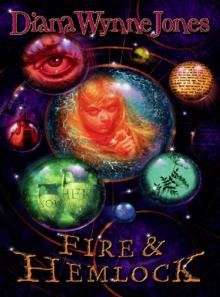 Fire and Hemlock
Fire and Hemlock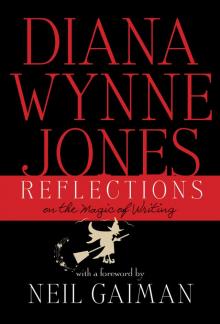 Reflections: On the Magic of Writing
Reflections: On the Magic of Writing The Game
The Game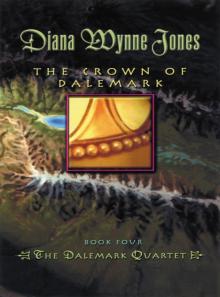 The Crown of Dalemark
The Crown of Dalemark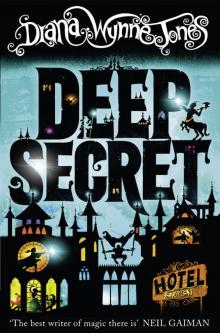 Deep Secret
Deep Secret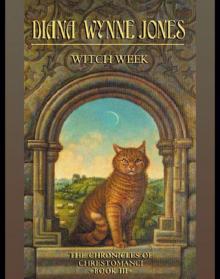 Witch Week
Witch Week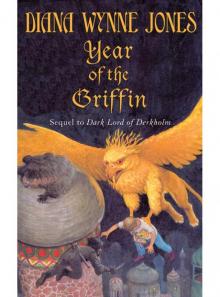 Year of the Griffin
Year of the Griffin Wild Robert
Wild Robert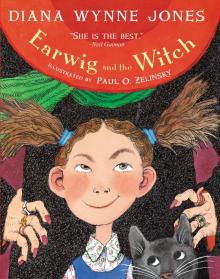 Earwig and the Witch
Earwig and the Witch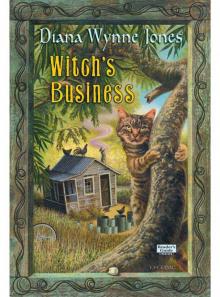 Witch's Business
Witch's Business Dogsbody
Dogsbody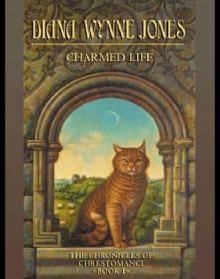 Caribbean Cruising
Caribbean Cruising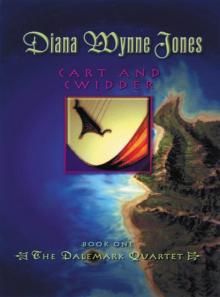 Cart and Cwidder
Cart and Cwidder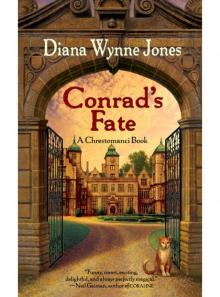 Conrad's Fate
Conrad's Fate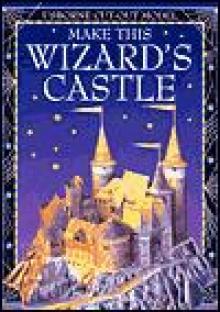 Howl's Moving Castle
Howl's Moving Castle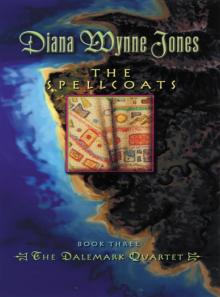 The Spellcoats
The Spellcoats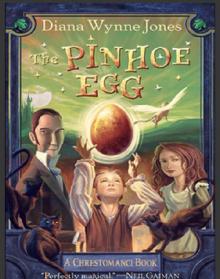 The Pinhoe Egg
The Pinhoe Egg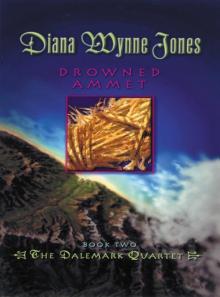 Drowned Ammet
Drowned Ammet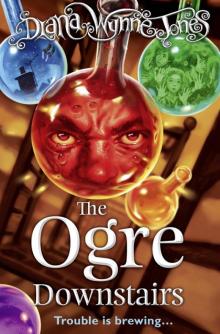 The Ogre Downstairs
The Ogre Downstairs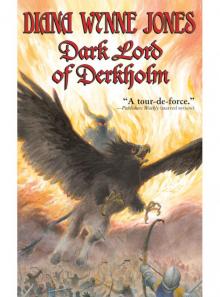 Dark Lord of Derkholm
Dark Lord of Derkholm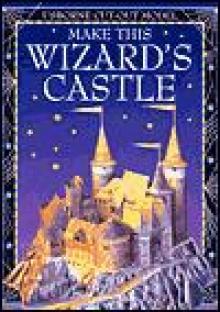 Castle in the Air
Castle in the Air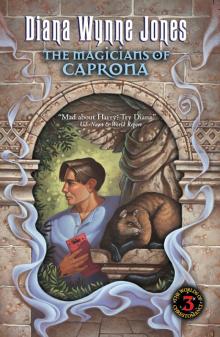 The Magicians of Caprona
The Magicians of Caprona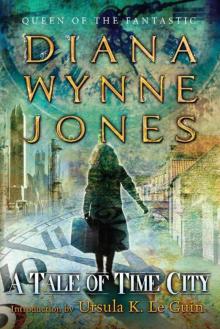 A Tale of Time City
A Tale of Time City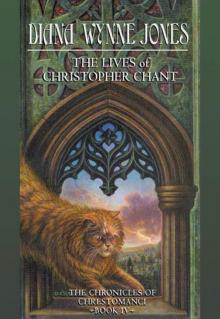 The Lives of Christopher Chant
The Lives of Christopher Chant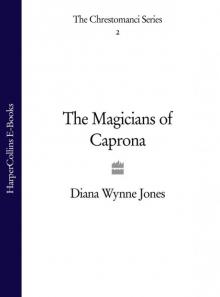 The Magicians of Caprona (UK)
The Magicians of Caprona (UK)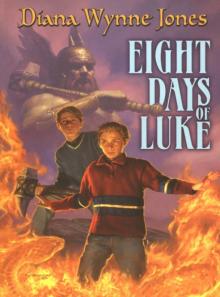 Eight Days of Luke
Eight Days of Luke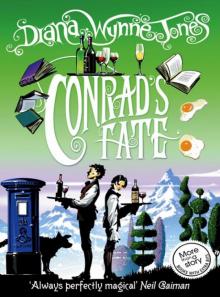 Conrad's Fate (UK)
Conrad's Fate (UK)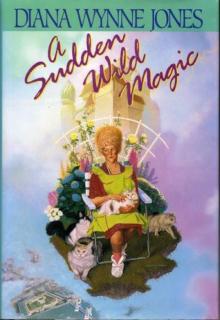 A Sudden Wild Magic
A Sudden Wild Magic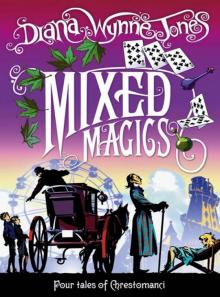 Mixed Magics (UK)
Mixed Magics (UK)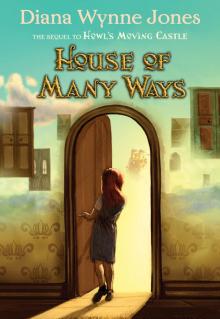 House of Many Ways
House of Many Ways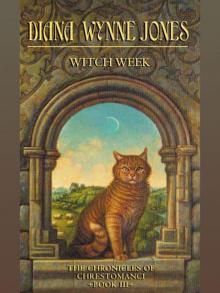 Witch Week (UK)
Witch Week (UK)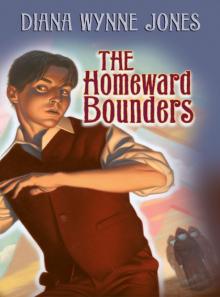 The Homeward Bounders
The Homeward Bounders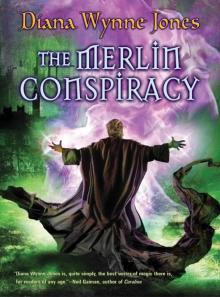 The Merlin Conspiracy
The Merlin Conspiracy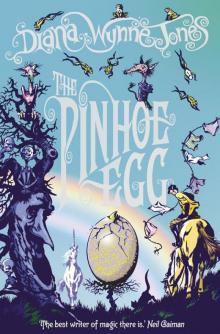 The Pinhoe Egg (UK)
The Pinhoe Egg (UK)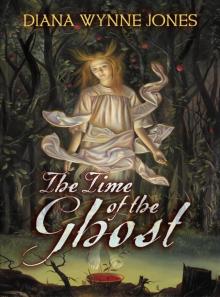 The Time of the Ghost
The Time of the Ghost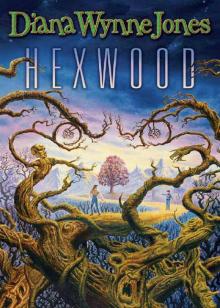 Hexwood
Hexwood Enchanted Glass
Enchanted Glass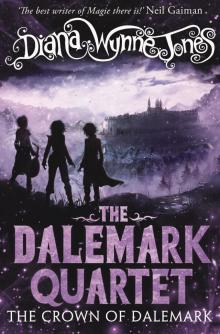 The Crown of Dalemark (UK)
The Crown of Dalemark (UK)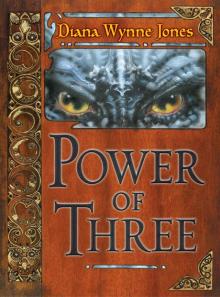 Power of Three
Power of Three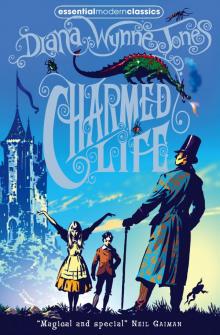 Charmed Life (UK)
Charmed Life (UK)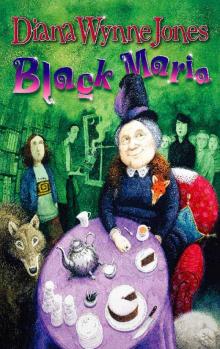 Black Maria
Black Maria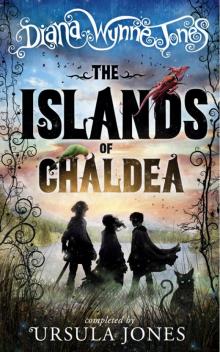 The Islands of Chaldea
The Islands of Chaldea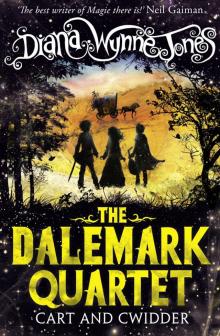 Cart and Cwidder (UK)
Cart and Cwidder (UK)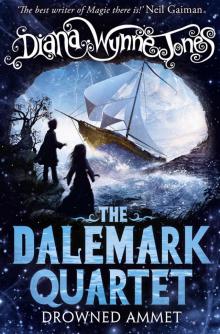 Drowned Ammet (UK)
Drowned Ammet (UK)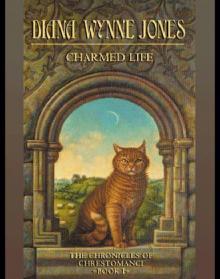 Charmed Life
Charmed Life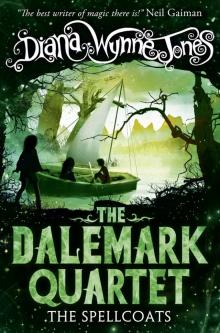 The Spellcoats (UK)
The Spellcoats (UK)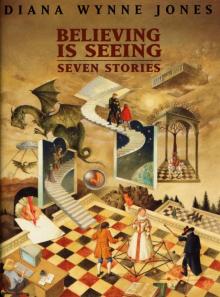 Believing Is Seeing
Believing Is Seeing Samantha's Diary
Samantha's Diary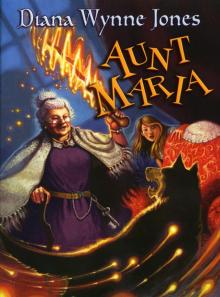 Aunt Maria
Aunt Maria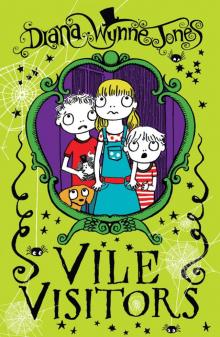 Vile Visitors
Vile Visitors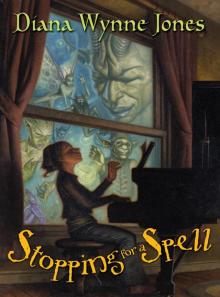 Stopping for a Spell
Stopping for a Spell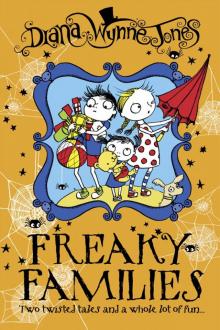 Freaky Families
Freaky Families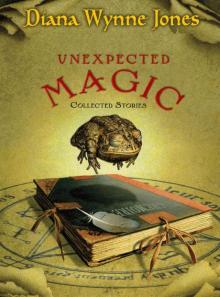 Unexpected Magic
Unexpected Magic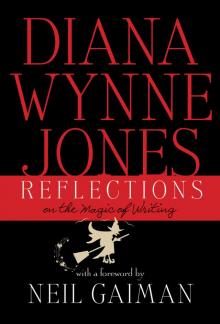 Reflections
Reflections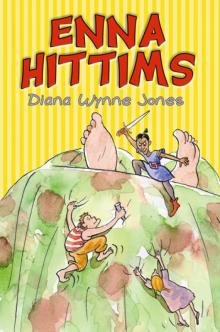 Enna Hittms
Enna Hittms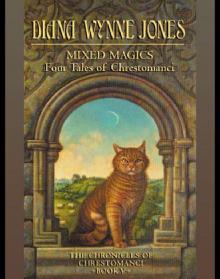 Mixed Magics: Four Tales of Chrestomanci
Mixed Magics: Four Tales of Chrestomanci